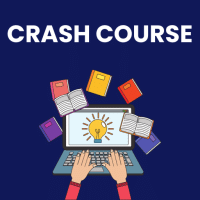B.Ed Entrance Exam > B.Ed Entrance Questions > What does evaluation of learning outcomes pri...
Start Learning for Free
What does evaluation of learning outcomes primarily involve?
- a)Gathering evidences related to students' learning
- b)Making judgments solely based on gathered evidences
- c)Formal testing procedures
- d)Assigning numerical scores
Correct answer is option 'B'. Can you explain this answer?
Verified Answer
What does evaluation of learning outcomes primarily involve?a)Gatherin...
Evaluation of learning outcomes entails making informed judgments based on gathered evidence related to students' learning, which goes beyond just collecting data or assigning scores. It involves analyzing and interpreting the evidence to assess the level of understanding and skill acquisition.
View all questions of this test
Most Upvoted Answer
What does evaluation of learning outcomes primarily involve?a)Gatherin...
Understanding Evaluation of Learning Outcomes
Evaluation of learning outcomes is a critical aspect of the educational process. It goes beyond mere assessment; it is an intricate process that involves making informed judgments about a student's performance based on various forms of evidence.
Key Aspects of Evaluation
- Comprehensive Analysis: Evaluation involves not just gathering evidence related to students' learning but also analyzing that evidence to form conclusions about their understanding and skills.
- Judgment Formation: The primary role of evaluation is to make judgments. This means interpreting the gathered evidence, understanding its significance, and assessing whether students have met the learning objectives.
- Holistic Approach: While formal testing procedures and numerical scores can provide insights, they are only parts of the larger picture. Effective evaluation considers various forms of evidence, including projects, presentations, and participation.
Why Option B is Correct
- Judgment-Based Evaluation: Option B emphasizes that making judgments is the core of evaluation. It highlights that the process is not simply about collecting data but also about interpreting that data to understand a student's learning journey.
- Beyond Numerical Scores: Focusing solely on numerical scores (as mentioned in option D) can lead to a narrow view of a student's abilities. Evaluating learning outcomes requires a more nuanced understanding, integrating qualitative insights with quantitative measures.
- Informed Decision-Making: By making judgments based on the evidence, educators can provide targeted feedback and support, facilitating student growth and improvement.
In conclusion, the essence of evaluating learning outcomes lies in the careful and thoughtful assessment of gathered evidence to form judgments that truly reflect student learning.
Evaluation of learning outcomes is a critical aspect of the educational process. It goes beyond mere assessment; it is an intricate process that involves making informed judgments about a student's performance based on various forms of evidence.
Key Aspects of Evaluation
- Comprehensive Analysis: Evaluation involves not just gathering evidence related to students' learning but also analyzing that evidence to form conclusions about their understanding and skills.
- Judgment Formation: The primary role of evaluation is to make judgments. This means interpreting the gathered evidence, understanding its significance, and assessing whether students have met the learning objectives.
- Holistic Approach: While formal testing procedures and numerical scores can provide insights, they are only parts of the larger picture. Effective evaluation considers various forms of evidence, including projects, presentations, and participation.
Why Option B is Correct
- Judgment-Based Evaluation: Option B emphasizes that making judgments is the core of evaluation. It highlights that the process is not simply about collecting data but also about interpreting that data to understand a student's learning journey.
- Beyond Numerical Scores: Focusing solely on numerical scores (as mentioned in option D) can lead to a narrow view of a student's abilities. Evaluating learning outcomes requires a more nuanced understanding, integrating qualitative insights with quantitative measures.
- Informed Decision-Making: By making judgments based on the evidence, educators can provide targeted feedback and support, facilitating student growth and improvement.
In conclusion, the essence of evaluating learning outcomes lies in the careful and thoughtful assessment of gathered evidence to form judgments that truly reflect student learning.

|
Explore Courses for B.Ed Entrance exam
|

|
Question Description
What does evaluation of learning outcomes primarily involve?a)Gathering evidences related to students' learningb)Making judgments solely based on gathered evidencesc)Formal testing proceduresd)Assigning numerical scoresCorrect answer is option 'B'. Can you explain this answer? for B.Ed Entrance 2025 is part of B.Ed Entrance preparation. The Question and answers have been prepared according to the B.Ed Entrance exam syllabus. Information about What does evaluation of learning outcomes primarily involve?a)Gathering evidences related to students' learningb)Making judgments solely based on gathered evidencesc)Formal testing proceduresd)Assigning numerical scoresCorrect answer is option 'B'. Can you explain this answer? covers all topics & solutions for B.Ed Entrance 2025 Exam. Find important definitions, questions, meanings, examples, exercises and tests below for What does evaluation of learning outcomes primarily involve?a)Gathering evidences related to students' learningb)Making judgments solely based on gathered evidencesc)Formal testing proceduresd)Assigning numerical scoresCorrect answer is option 'B'. Can you explain this answer?.
What does evaluation of learning outcomes primarily involve?a)Gathering evidences related to students' learningb)Making judgments solely based on gathered evidencesc)Formal testing proceduresd)Assigning numerical scoresCorrect answer is option 'B'. Can you explain this answer? for B.Ed Entrance 2025 is part of B.Ed Entrance preparation. The Question and answers have been prepared according to the B.Ed Entrance exam syllabus. Information about What does evaluation of learning outcomes primarily involve?a)Gathering evidences related to students' learningb)Making judgments solely based on gathered evidencesc)Formal testing proceduresd)Assigning numerical scoresCorrect answer is option 'B'. Can you explain this answer? covers all topics & solutions for B.Ed Entrance 2025 Exam. Find important definitions, questions, meanings, examples, exercises and tests below for What does evaluation of learning outcomes primarily involve?a)Gathering evidences related to students' learningb)Making judgments solely based on gathered evidencesc)Formal testing proceduresd)Assigning numerical scoresCorrect answer is option 'B'. Can you explain this answer?.
Solutions for What does evaluation of learning outcomes primarily involve?a)Gathering evidences related to students' learningb)Making judgments solely based on gathered evidencesc)Formal testing proceduresd)Assigning numerical scoresCorrect answer is option 'B'. Can you explain this answer? in English & in Hindi are available as part of our courses for B.Ed Entrance.
Download more important topics, notes, lectures and mock test series for B.Ed Entrance Exam by signing up for free.
Here you can find the meaning of What does evaluation of learning outcomes primarily involve?a)Gathering evidences related to students' learningb)Making judgments solely based on gathered evidencesc)Formal testing proceduresd)Assigning numerical scoresCorrect answer is option 'B'. Can you explain this answer? defined & explained in the simplest way possible. Besides giving the explanation of
What does evaluation of learning outcomes primarily involve?a)Gathering evidences related to students' learningb)Making judgments solely based on gathered evidencesc)Formal testing proceduresd)Assigning numerical scoresCorrect answer is option 'B'. Can you explain this answer?, a detailed solution for What does evaluation of learning outcomes primarily involve?a)Gathering evidences related to students' learningb)Making judgments solely based on gathered evidencesc)Formal testing proceduresd)Assigning numerical scoresCorrect answer is option 'B'. Can you explain this answer? has been provided alongside types of What does evaluation of learning outcomes primarily involve?a)Gathering evidences related to students' learningb)Making judgments solely based on gathered evidencesc)Formal testing proceduresd)Assigning numerical scoresCorrect answer is option 'B'. Can you explain this answer? theory, EduRev gives you an
ample number of questions to practice What does evaluation of learning outcomes primarily involve?a)Gathering evidences related to students' learningb)Making judgments solely based on gathered evidencesc)Formal testing proceduresd)Assigning numerical scoresCorrect answer is option 'B'. Can you explain this answer? tests, examples and also practice B.Ed Entrance tests.

|
Explore Courses for B.Ed Entrance exam
|

|
Signup for Free!
Signup to see your scores go up within 7 days! Learn & Practice with 1000+ FREE Notes, Videos & Tests.























